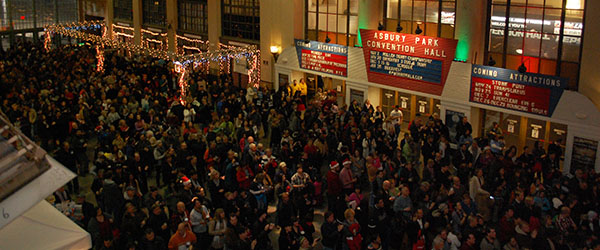Madison Marquette: Without parking lots, Convention Hall’s future unclear
Redevelopers say plans have been stymied by city; Reidy disagrees
Boardwalk redeveloper Madison Marquette may shut down Convention Hall if it cannot continue its use of three surface parking lots in the city’s waterfront redevelopment area, said Gary Mottola, president of property investments for the group, yesterday.
Madison Marquette is asking the city to acquiesce to several requests in order for the redeveloper to continue investing in the city’s boardwalk and the music venues at the Paramount Theatre, Convention Hall, the Stone Pony and the Wonder Bar, Mottola said.
If the city denies the requests, the redeveloper may instead shut down Convention Hall, which they says is unprofitable, and shift focus to other businesses rather than in investing further in its properties, Mottola said.
“We’re in a situation where we liked the trajectory we were on,” Madison Marquette’s senior vice president, Anselm Fusco, said yesterday. “We can’t rationally continue on that same trajectory … When you operate the building [Convention Hall] at a loss every year in service of a larger strategy, there is a rationale to that. When that strategy changes out of necessity because of these external events [such as losing the parking lots and losing the Bamboozle music festival], you can no longer justify the irrational expense in the absence of a strategy.”
State fire codes changed in 2006, and Madison Marquette was then required to install sprinklers throughout Convention Hall. Madison Marquette was required to install the sprinklers by March 21 if Convention Hall is to remain open, according to a consent order. The city granted the redeveloper 45 more days due to Hurricane Sandy. The new deadline for sprinkler installation is the first weekend in May. No events have been scheduled in Convention Hall past May 1.
City manager Terence Reidy questions why Madison Marquette has not installed the sprinklers already.
“Madison Marquette is a multi-million-dollar international corporation,” Reidy said. “What’s the issue here? How does the city of Asbury Park get to be the bad guy?”
Madison Marquette officials say they have been working on plans for the sprinklers since fire codes changed five years ago. The sprinklers are expected to cost about $1 million to install, they said.
Mottola and Fusco say the sprinkler installation is not economically feasible, particularly because of issues stymieing their business plan. The issues include, but are not limited to, parking and the cancellation of the Bamboozle music festival this year.
“Right now, we have to close Convention Hall 100 percent” under the terms of the consent order if sprinklers cannot be installed, Mottola said. “If the city elects to find a different way, we’ll certainly listen.”
City manager Terence Reidy said a loan from the Economic Development Authority [EDA] is most likely available for the sprinklers’ installation. The loan would have a very low interest rate, he said, and would not need to be paid back for the first two years.
Fusco and Mottola said yesterday that the group does not wish to borrow funds for the sprinklers.
Many area residents have organized petitions to keep Convention Hall open and have asked why Madison Marquette does not hold a fundraiser to install the sprinklers. Mottola and Fusco feel it would be inappropriate for a for-profit company such as theirs to hold a fundraiser, they said.
“We are looking at the overall picture as well as partial solutions,” Fusco said. “We need to find something that is economically rational that we can justify to our investors. We understand everybody wants the building open and we want to find a way to keep it open.”
PARKING LOTS NECESSARY, MADISON MARQUETTE SAYS
Madison Marquette has used three surface parking lots in the waterfront redevelopment area for the past five years. Asbury Partners, whose majority owner is iStar Financial, owns the lots, which contain about 600 spaces. Madison Marquette became a minority owner of Asbury Partners in 2012.
A surface parking lot is not a permitted use under the waterfront redevelopment plan, so the city had to grant Madison Marquette and iStar permission to use the lots as such for three years, starting in 2008. When that agreement expired, the city granted a two-year extension, which expired in December 2012.
Asbury Partners is required to provide 600 parking spaces under the waterfront redevelopment plan, Reidy said, but Madison Marquette does not have legal rights to control those parking spaces. Further use of the lots as public parking requires special permission from the city, whether Madison Marquette is in control or not.
The city has negotiated with iStar about use of the lots. The process has been “very positive,” Reidy said. “[Vice president of land] Brian Cheripka and the whole iStar team are focused on the same thing as the city is focused on.”
The city wants to see the lots continue in their current use, Reidy said, but city officials are not willing to give Madison Marquette the right to control those lots permanently.
“Why would the city give up [600 public parking spaces]?” Reidy said. He also cited concerns that permanently giving control of the 600 public spaces to Madison Marquette could lead to other developers asking why they haven’t been given public spaces to control.
Madison Marquette invested about $1 million to pave, stripe and construct the lots, Mottola said. Madison Marquette employs local young people to work at the lots all summer. The company does not turn a profit on the parking lots, he said.
“If you’re asked to create a major retail and entertainment destination, you need to have parking,” Mottola said. “You need to have control of your parking. Without parking, your project fails.”
The city wants to incorporate the lots into a city-wide parking plan. Since Madison Marquette first began to use the lots in 2008, the city has implemented metered parking throughout the central business district and waterfront redevelopment areas, and the three surface lots are surrounded by the city’s paid spaces.
The city cannot place meters on those lots without permission from Asbury Partners, which owns the property, Reidy said. Also, the lots are sometimes used for valet parking for special events, and the city does not want to disrupt that.
“We let them use the lots [in 2008] for parking to support the retailers,” Reidy said. “It all made sense. But at the same time, we knew that we didn’t want the parking lots to be there forever, because that would impede development.”
The city did not yet have a parking utility at the time that the surface parking lot agreement was reached. Now, the city has established a parking utility and is developing a parking management strategy, Reidy said.
“We do want to have a uniform parking management plan for this city, and having a developer controlling 600 of those spaces, doing whatever he wants with those spaces, I don’t think that’s good planning, quite frankly,” Reidy said.
The city has tried to work with Mottola and Madison Marquette to devise a plan that would enable the city to have a hand in the three lots while allowing Madison Marquette to still use them for valet parking and events as needed, he said. Both parties said negotiations are at a standstill.
“Why would I knowingly set up competition to the city?” Reidy said of allowing use of the lots to continue. “There’s not a lot of areas we can generate revenue in the city of Asbury Park.”
OTHER ISSUES
Reasons for the possible shuttering of Convention Hall extend far beyond the sprinkler issue and even the parking lots, Mottola and Fusco said.
Just under a year ago, Madison Marquette began to evaluate the possibilities for its next phase of development. They hoped to rehabilitate the Sunset Pavilion, the Bandshell and the Casino Building, as well as to make significant improvements to the Stone Pony and the Wonder Bar. They also needed to install the sprinkler system. This phase of development, they thought, would begin in 2013.
Then, Madison Marquette learned that the city was thinking of terminating its rights to the surface parking. This was “a red flag,” Mottola said, and one of several roadblocks in Madison Marquette’s eyes.
Madison Marquette was also discouraged when the Bamboozle music festival decided not to return to Asbury Park this year. The festival took place on the boardwalk and in surrounding areas last year, bringing more than 100,000 people into the city.
“I always thought a festival was an absolutely critical part of [developing the city’s entertainment culture],” Mottola said. “Individual [music events] are hit-or-miss. You need something you can coalesce your whole year around … It’s an economic benefit to the city, a morale boost, an emotional boost.”
The Bamboozle festival was run by LiveNation, which partners with Madison Marquette on concert booking and promotion. LiveNation’s Asbury offices are adjacent to Madison Marquette, and LiveNation has agreed to stay in Asbury Park for at least another three years, Mottola said.
When asked why Bamboozle’s organizers decided not to come back this year, Mottola said, “The city was very difficult. This year, the city made it impossible for Bamboozle to come back. They set terms that were impossible and basically killed it.”
Reidy said the city was “at the table negotiating with Bamboozle,” and city officials are “very disappointed” that the festival is not coming back.
During negotiations, “Bamboozle came [to the city] with a proposal,” Reidy said. “The city came back with a counter offer. Bamboozle did not come back with another offer.”
Reidy was out sick for about a week, and when he came back, “Bamboozle had made a decision not to have Bamboozle. Not in Asbury, not anywhere. So saying the city made it impossible … That’s an incendiary remark.”
The Bamboozle issue is linked to Madison Marquette’s plans for the entire boardwalk and waterfront area because such large-scale festivals are becoming so popular nationwide, Mottola and Fusco said. But those festivals are resource-intensive.
“They take a lot of planning and you need a context that lends itself to all that effort,” Fusco said, “including parking. And in the absence of that infrastructure, you don’t want to waste your time trying.”
And Convention Hall’s business depends on Madison Marquette’s relationship with Bamboozle organizers LiveNation, Mottola said. All events held at Convention Hall are co-promoted with LiveNation, he said, and having Convention Hall open and funded is dependent on having national events, like Bamboozle, co-promoted with LiveNation.
Parking, the Bamboozle festival and Convention Hall’s future are all “part of an overall effort to deliver an entertainment experience for people coming out here,” Fusco said. “These three things fit together.”
THREE REQUESTS
Madison Marquette has made three requests of the city. If the city cannot acquiesce, Madison Marquette may pull back its development efforts and run the boardwalk in a more conservative manner, Mottola said.
The first request is for Madison Marquette to maintain the 600 parking spaces in the waterfront area.
Second, Madison Marquette wants a guarantee that the city’s workers will maintain the beach, which includes emptying trash cans and cleaning public restrooms.
“The city is supposed to maintain the restrooms and they don’t,” Mottola said. “We do.”
Reidy said this issue has been discussed, and that the city agreed to step up maintenance in the boardwalk and waterfront area after he was notified of the issue.
Third, Madison Marquette wants operational costs and allowed uses to be clearly defined so that appropriate business decisions can be made and implemented.
This would include permanent approval of temporary uses like the pop-up vendors on the boardwalk, as well as clear information on fees Madison Marquette is required to pay the city, such as the $250,000 special impact fee it contributes annually.
“We understand the city is a transitional aid city that’s in a perpetual search for revenue, but we shouldn’t always be the target,” Mottola said.
The city and Madison Marquette are having ongoing conversations about these issues, Fusco said.
“There is some resolution to all of them,” Fusco said. “It’s the question of when and how they get resolved that we’re still unclear on.”
BEACH FRONT REVENUE AND A DROP IN CRIME
Madison Marquette created graphs depicting increases in revenue for the city since 2006. According to the graphs, revenue from beach fees for the city climbed from under $100,000 to $1 million from 2006 to 2012. Waterfront parking revenue went from $0 in 2007 to about $1.5 million in 2012, according to the graph.
State sales tax revenue in the Asbury Park waterfront area has climbed from under $100,000 in 2007 to $2 million in 2012, according to the graphs. And waterfront job growth has gone from under 100 jobs created in 2007 to almost 1,000 jobs created in 2012.
Crime rates saw a net decrease from 2005 through 2011, according to the graphs. Total crime in the waterfront consisted of almost 200 incidents in 2005. In 2011, there were about 100 incidents.
These statistics “show what happens when you create a great community,” Mottola said.
Madison Marquette currently has 1,000 events listed on its website, ranging from musicians playing on the boardwalk to the large-scale Bamboozle music festival that took place last year.
“Those thousand events were basically zero six years ago,” Mottola said. “All of those events require a large staff to coordinate and promote. That’s an investment we made.”
Madison Marquette employs “hundreds” of people in the boardwalk businesses, at the Stone Pony and at the Wonder Bar, Mottola said. They also have an administrative office with 10 to 12 employees at 1100 Ocean Ave.
MADISON MARQUETTE’S FUNDING
Madison Marquette has invested $92 million in boardwalk redevelopment since 2007, Mottola said. They use funds from investors — a significant amount of which are public pension funds.
“This isn’t a bunch of wealthy people,” Mottola said of Madison Marquette’s investors. “We’re not investing on behalf of a bunch of one-percenters. Public pension funds are in the investment pool we’ve been asked to manage money and manage investments for, so we take that seriously.”
The group is hesitant to invest the estimated $1 million in new sprinklers at Convention Hall if they are unable to use parking, because this could cause them to lose more money on a venue that they already operate at a loss, Mottola said.
“It’s a fiduciary responsibility we have to our investors,” Fusco said. “It’s public pension fund money and we have to protect it.”
The group operates Convention Hall at a loss, and they have already invested $17 million in the complex, Fusco said.
As a retail development company, Madison Marquette collects revenue mainly from the rent its tenants pay, Mottola said. This includes several small businesses, as well as two bars, inside Convention Hall’s arcade and along the building’s northern and southern perimeters.
These business owners have approached Reidy to ask him if Convention Hall will be open this summer, he said. Originally, officials thought that the Grand Arcade could open because it serves as a walkway connecting the northern and southern portions of the boardwalk. But it turns out that any structure with a roof higher than 120 feet must have sprinklers, and the Grand Arcade’s roof is 150 feet high, Reidy said.
Madison Marquette has allowed several groups to use Convention Hall free of charge or at a deep discount, Mottola said. This includes ReVision Theatre Company, Premier Theatre Company and the Garden State Film Festival.
Adding to the difficulty, selling tickets in Asbury Park “is still a challenge,” Fusco said. “The same show at the Count Basie [in Red Bank] sells out in a week. Here, you have to work for two months to sell it out.”
The Paramount Theatre has 1,600 seats, while capacity in Convention Hall is 3,600, Fusco said. The Stone Pony’s Summer Stage has a capacity of 4,500 people, and the Stone Pony can fit about 800 people. The Wonder Bar’s capacity is 350.
In all, this comprises more than 90 percent of the live music venue capacity in the city, Mottola said.







